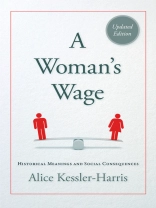In this updated edition of a groundbreaking classic, Alice Kessler-Harris explores the meanings of women’s wages in the United States in the twentieth and twenty-first centuries, focusing on three issues that capture the transformation of women’s roles: the battle over minimum wage for women, which exposes the relationship between family ideology and workplace demands; the argument concerning equal pay for equal work, which challenges gendered patterns of self-esteem and social organization; and the debate over comparable worth, which seeks to incorporate traditionally female values into new work and family trajectories. Together, these topics illuminate the many ways in which gendered social meaning has been produced, transmitted, and challenged.
Tabella dei contenuti
Introduction
A Wage Conceived: Value and Need as Measures of a Woman’s Worth
Law and a Living: The Gendered Content of ‘Free Labor’ in the Progressive Period
Providers: An Exploration of Gender Ideology in the 1930s
The Double Meaning of Equal Pay
The Just Price, the Free Market, and the Value of Women
A Woman’s Wage, Redux
Circa l’autore
Alice Kessler-Harris is R. Gordon Hoxie Professor of American History and professor in the Institute for Research on Women and Gender at Columbia University. She is the author of numerous books, including In Pursuit of Equity: Women, Men and the Quest for Economic Citizenship in Twentieth Century America; Out to Work: A History of Wage-Earning Women in the United States; and A Difficult Woman: The Challenging Life and Times of Lillian Hellman.












